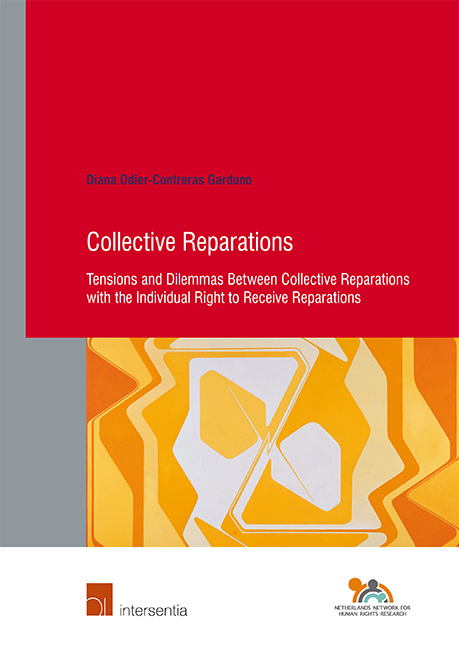 Collective Reparations
Collective Reparations Book contents
- Frontmatter
- Acknowledgments
- Table of Contents
- Abbreviations
- Chapter I Introduction
- Chapter II Developments Concerning the Right to Reparation
- Chapter III Collective Reparations at the Inter-American Court of Human Rights
- Chapter IV Collective Reparations in International Criminal Law
- Chapter V Collective Reparations & Non-Judicial Bodies
- Chapter VI Conclusions
- Samenvatting
- Resumen
- Résumé
- Bibliography
- Table of Instruments
- Table of Cases, Decisions and Filings
- Curriculum Vitae
- Human Rights Research Series
Chapter IV - Collective Reparations in International Criminal Law
Published online by Cambridge University Press: 31 January 2019
- Frontmatter
- Acknowledgments
- Table of Contents
- Abbreviations
- Chapter I Introduction
- Chapter II Developments Concerning the Right to Reparation
- Chapter III Collective Reparations at the Inter-American Court of Human Rights
- Chapter IV Collective Reparations in International Criminal Law
- Chapter V Collective Reparations & Non-Judicial Bodies
- Chapter VI Conclusions
- Samenvatting
- Resumen
- Résumé
- Bibliography
- Table of Instruments
- Table of Cases, Decisions and Filings
- Curriculum Vitae
- Human Rights Research Series
Summary
Today's conflicts are often rooted in the failure to repair yesterday's injury’ Roy S. Lee
Introduction
International criminal law was originally based on the tenets of retributive justice and thus assumed an offender-driven approach. This changed with the establishment of the permanent International Criminal Court (ICC or the Court), which marked a significant advancement in the recognition of the rights of victims in international criminal law proceedings. This includes the right to reparations. The ICC was the first international permanent criminal tribunal that had the power to deliver justice beyond retributive justice, as it recognises ‘the need to provide effective remedies for victims.’ It thus affords victims the right to seek and receive reparations, including restitution, compensation, rehabilitation and collective awards, as well as ‘other forms of reparations.’ The ICC's redress mandate was further enhanced by the creation of the Trust Fund for Victims (TFV or Trust Fund), an institution tasked with implementing reparations and providing humanitarian assistance to victims in cases appearing before the ICC.
Following the establishment of the ICC, the Extraordinary Chambers in the Courts of Cambodia (ECCC or the Extraordinary Chambers), an internationalised hybrid criminal tribunal, also recognised the right of victims to seek and receive reparations. The tribunal is “internationalised” in the sense that it is a national institution that requires international participation: although its legal framework is national law, the ECCC emerged out of an international agreement between the Cambodian government and the United Nations to prosecute the crimes committed by the leaders of the Khmer Rouge. The ECCC's reparations mandate is more limited than that of the ICC: it can only grant collective and moral measures of reparation. Since 2010, the ECCC's redress mandate has been reinforced by the Victims Support Section (VSS), which has the power to create and implement non-judicial programmes for the benefit of victims. In addition, it can design, implement and secure external funding for reparation projects.
Of the existing international criminal tribunals,15 only the ICC and the ECCC are empowered to award collective reparations to victims upon the accused's conviction.16 This chapter analyses the normative framework for reparations with regard to both of these international criminal tribunals, as well as their emerging practice regarding collective reparations. Although the two tribunals’ statutes and rules do not provide a definition of collective reparations, both courts have exercised their remedial powers.
- Type
- Chapter
- Information
- Collective ReparationsTensions and Dilemmas Between Collective Reparations and the Individual Right to Receive Reparations, pp. 175 - 248Publisher: IntersentiaPrint publication year: 2018


